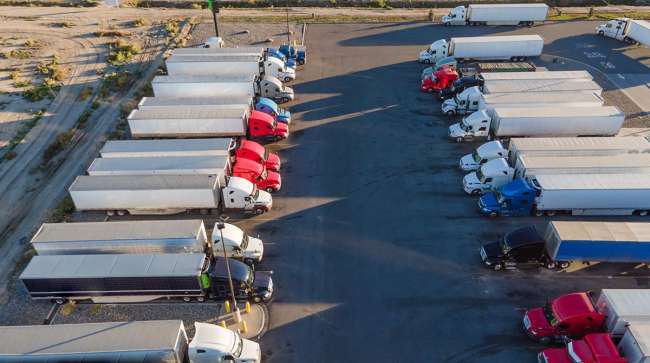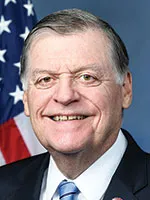Senior Reporter
House Fiscal 2025 Bill Allocates $200 Million for Truck Parking

[Stay on top of transportation news: Get TTNews in your inbox.]
WASHINGTON — A fiscal 2025 House committee-approved transportation funding bill would dedicate $200 million for expanding parking availability for the nation’s truck drivers.
The Appropriations Committee on July 10 gave partisan backing to legislation that would ensure programs at the U.S. Department of Transportation are funded during the upcoming fiscal year.
The measure’s Republican sponsors applauded its focus on safety and supply chain efficiency.
“The bill prioritizes the safety of all modes of transportation from our railways to roads and airways. We ensure a responsible safety net with housing support for our most vulnerable citizens,” said Rep. Steve Womack (R-Ark.), chairman of the Transportation, Housing and Urban Development, and Related Agencies Appropriations Subcommittee.
“Whether on a highway or airport runway, the strength of our transit systems, flow of freight, and safety of the traveling public are prioritized,” Appropriations Committee Chairman Tom Cole (R-Okla.) added. “Safety net resources to help vulnerable populations, including veterans and the elderly, are maintained.”
The legislation also would advance programs at the Department of Housing and Urban Development.
The parking funds included in the bill would be managed by the department’s Nationally Significant Multimodal Freight and Highway Projects program with priority given to rural corridors. An explanatory report accompanying the legislation noted: “The committee expects DOT to continue working proactively with the private sector, states and metropolitan planning organizations to address this critical supply chain challenge, to encourage the use of formula funds for investment in new truck parking capacity, and to prioritize truck parking when considering discretionary funding awards.”

Cole
Specific to the trucking industry, the legislation would dedicate $909 million for operations at the Federal Motor Carrier Safety Administration.
“This funding supports nationwide motor carrier safety and consumer enforcement efforts, including the compliance, safety and accountability program, regulation and enforcement of freight transport, and federal safety enforcement at the U.S. borders,” per the report’s emphasis on the agency tasked with regulating the trucking industry.
Additionally, the transportation bill would block enforcement of electronic logging devices for carriers transporting livestock or insects. It would prohibit inward-facing cameras as part of a commercial driver apprenticeship. And it would pause rulemaking associated with speed-limiting devices for commercial vehicles. The measure also would urge FMCSA to assist in the development of guidelines that safeguard against predatory towing.
American Trucking Associations touted the bill’s provisions.

Spear
“Charging truck owners thousands of dollars for each unwanted tow and holding cargo hostage with excessive invoices are egregious practices that disrupt our supply chain,” ATA President Chris Spear said July 11. “ATA and our federation of state associations are fighting back against these predatory towers and ransom payments that target the truckers we depend on to deliver our nation’s goods.
“We welcome this important step forward to develop common-sense reforms that will inject more transparency and fairness into the system and hold unscrupulous companies accountable.”
Who Gets What?
For other agencies within the Department of Transportation, the bill would provide …
Federal Highway Administration: $63.5 billion
Federal Aviation Administration: $21.6 billion
Federal Transit Administration: $15.3 billion
Federal Railroad Administration: $2.7 billion
National Highway Traffic Safety Administration: $1.2 billion
Rep. Rosa DeLauro (D-Conn.), ranking member on the Appropriations Committee, explained her caucus’ opposition to the legislation.
“Democrats are working hard to connect our communities and make our transportation infrastructure more reliable. Meanwhile, the House Republican bill makes commutes longer, causes service delays and incites cancellations to major and desperately needed transportation infrastructure improvement projects.”

DeLauro
Speaking with reporters recently, Secretary Pete Buttigieg observed: “In terms of what we’re seeing from appropriators, I’m glad that there seems to be robust support for aviation and aviation safety but concerned about cuts to other areas that we think are really important.”
Relatedly, House Republican lawmakers backed separate fiscal 2025 funding bills that included provisions specific to the trucking industry. The measures would direct the Department of Health and Human Services to produce hair testing guidelines as an alternative drug testing for commercial drivers as well as establish a Supply Chain Fraud and Theft Task Force.

Hanscom
“The trucking industry takes great pride in delivering America’s freight safely and on time,” said Henry Hanscom, ATA’s senior vice president of legislative affairs. “The billions of tons of goods transported by trucks to every American community have increasingly become a prime target for organized crime, putting truck drivers at risk and raising costs for consumers.”
Meanwhile, House leaders have yet to schedule consideration for the White House’s emergency funding request to repair the bridge that collapsed in Baltimore this year. The White House detailed a request for about $3 billion to rebuild Baltimore’s Francis Scott Key Bridge in a letter to House Speaker Mike Johnson (R-La.).
Sen. Patty Murray (D-Wash.), chairwoman of the Appropriations Committee, has endorsed the White House’s emergency request. This month, her panel formally kicked off its consideration of the dozen annual appropriations bills.
“We still have a lot of work ahead of us to go from top lines to final passage of strong bipartisan bills,” she said.
Fiscal 2025 measures have not cleared for President Joe Biden’s signature. Failure to enact the bills by Oct. 1 would result in a partial federal shutdown.
Want more news? Listen to today's daily briefing below or go here for more info:




